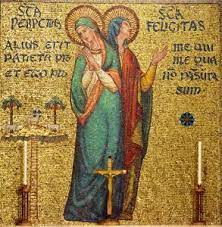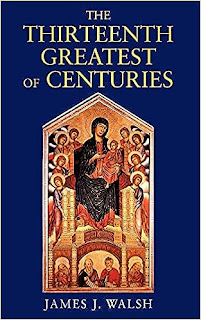After the scriptures, the most popular Christian literature in the Church’s early and formative centuries was the narratives of the martyrs – their passion and death recalling and, in a sense, reenacting the passion and death of Jesus himself. Often, a local community composed such accounts, in the form of often highly stylized, edifying narratives. In the case of today’s 3rd-century African martyrs, SS. Perpetual and Felicity, however, Perpetua herself wrote her own account of her imprisonment and her dialogue with her father.
Actually, six people – four men and two women – were martyred on this date in the year 203, but it is the story of the two women which made the most impression on the ancient Christian imagination. Perpetua was a married noblewoman in her early 20s, nursing an infant son, when she was arrested, along with a pregnant slave, Felicity. Both were catechumens at the time. In the narrative, Perpetua’s aristocratic father tried to persuade her to recant her Christian belief, but she defied family pressure and was baptized before being martyred.
In American Christianity today, there is a lot of emphasis on “family,” so much so that it may sometimes seem as if family is what Church and parish life are mainly all about. Under ordinary circumstances, of course, family is important. The story of SS. Perpetual and Felicity reminds us, however, that, whatever importance family relationships rightly have in our ordinary lives, our call to be disciples challenges all our ordinary loyalties, affections and relationships, even the most socially significant and emotionally fulfilling.
Homily on the Tuesday of the Second Week of Lent, the Commemoration of SS. Perpetua and Felicity, Saint Paul the Apostle Church, NY, March 7, 2023.
Image: SS. Perpetua and Felicity, Basilica of the National Shrine of the Immaculate Conception, Washington, DC.




